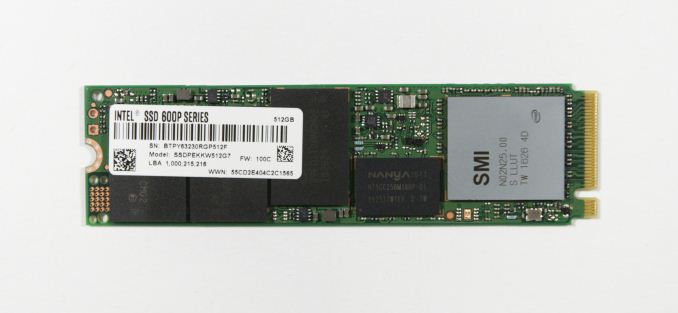Latest Windows 10 Version Incompatible With Intel SSD 600p
by Billy Tallis on May 11, 2018 5:00 AM EST
Microsoft has advised that the most recent version of Windows 10—version 1803, codenamed Redstone 4—is currently incompatible with the Intel SSD 600p and the related Intel SSD Pro 6000p. Windows 10 version 1803 can crash when attempting to update Windows 10 installed to an affected SSD. The Intel SSD DC P3100 and SSD E 6000p were not mentioned but are probably also affected as they share the same controller and firmware platform as the 600p.
The Intel SSD 600p consumer drive and its relatives for other market segments were Intel's first M.2 NVMe SSDs, a radical shift from the large Intel SSD 750 and its enterprise counterparts. The 600p family uses Intel's first-generation 32-layer 3D TLC NAND flash memory and a customized variant of the Silicon Motion SM2260 NVMe SSD controller. This combination made for the first low-end, (relatively) low-cost NVMe SSD, though more recent drives with controllers designed specifically for the entry-level NVMe market have now reached much lower prices than the 600p sold for when it was current. Intel's replacement for the 600p is the Intel SSD 760p, which uses a newer generation of 3D TLC NAND and a newer generation of controller from Silicon Motion. The 760p has not been reported to be affected by the same incompatibility as its predecessor.
It is not yet clear what is causing the incompatibility between the Intel 600p and Windows 10 version 1803, but the most likely culprit is a bug in the 600p's controller firmware. Intel has issued two firmware updates for the 600p family, each fixing several bugs including some that had the potential to cause data loss or corruption. The most common theme in the release notes for 600p firmware updates seems to be power management troubles, but those are unlikely to prevent Windows 10 v1803 from even installing to the 600p.
It is also possible that there's a bug with the 600p that cannot easily be fixed with a firmware update. The Linux NVMe driver has workarounds for two such issues with the 600p. The first workaround was for Linux to not attempt to use the deepest idle power state provided by the 600p; that was added about a year ago. The second workaround was added earlier this week. That issue is documented as affecting some P3100 drives but the workaround applies to everything in the 600p/P3100 family because they use the same PCI device IDs. The problem lies with the drive thinking that it has been instructed to use the optional weighted round robin method for deciding which queue to service commands from next, instead of the default simple round robin method. The workaround chosen by the Linux developers is to ensure that command submission queues on the 600p are assigned medium priority even when the driver doesn't intend to use the weighted priority feature.
For now, users with the Intel SSD 600p or one of its siblings are advised to not upgrade to Windows 10 version 1803, and Microsoft is working on a patch to allow version 1803 to work with the 600p. Owners of a 600p should also be on the lookout for a possible firmware update from Intel. The current version is 121 for the 600p, Pro 6000p and E 6000p, and version 119 for the P3100. A patch for this issue from either Microsoft or Intel would be sufficient to allow Windows 10 version 1803 to work with the 600p.
Other SSDs based on the SM2260 controller do not feature Intel's customized firmware, and historically have not been affected by the same bugs as the Intel 600p family.
Source: Microsoft










31 Comments
View All Comments
FXi - Wednesday, May 16, 2018 - link
I wonder why the 760p wasn't impacted as well since it also uses a similar (though newer gen) controller.